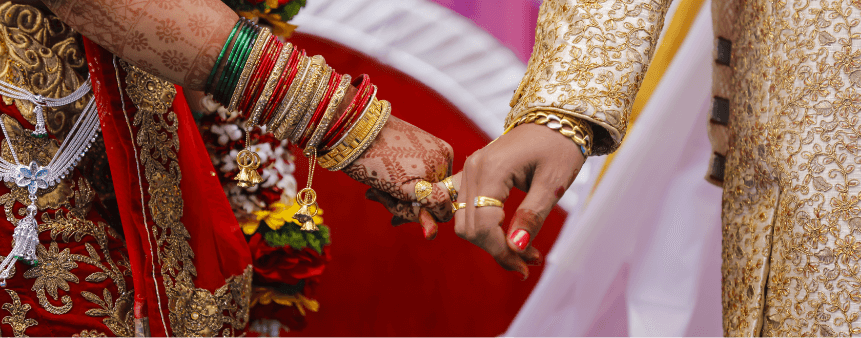Talk to India's best Astrologers
First Consultation at ₹1 only
Login
Enter your mobile number
Celebrated in March or April, Ugadi or Yugadi is the New Year's Day celebration of the Southern states of India, mainly Andhra Pradesh, Telangana, and Karnataka. This festival is observed on the first day of the Hindu Lunisolar Calendar month of Chaitra, and according to age-old customs and traditions, the lord of the day when Ugadi is observed will be considered the lord of the year. So, since Ugadi 2024 is set to fall on 9 April, a Tuesday, Lord Mars will rule over 2024.
The preparations for this special occasion start almost a week prior to the celebratory day and are a grand affair in itself. Moreover, people get together to set the tone of the celebration by making Rangolis in front of the entrances of their houses and invoking the Gods for their presence during the Ugadi festivities. If you have been wondering about the Ugadi pandaga date, the Ugadi Pooja timings, or even this year Ugadi date, then we have the information here.
While Ugadi 2023 took place on March 22, this year Ugadi festival date is set for 9 April, and the Ugadi Pooja timings, according to the Ugadi date is that the Pratipada Tithi begins at 11:50 PM on 8 April and ends at 8:31 PM on 9 April.
Celebrated as a grand affair in the Southern states of India, Ugadi has several legends and beliefs surrounding it, and most of them hint towards the unending cycle of life, new beginnings and new hope, and the human capabilities to keep going through tough times. According to the Ugadi meaning, the translation of this word is 'the beginning of a new age', and its meaning derives from the age-old legend surrounding Lord Brahma and the creation of the Universe.
While most people believe in different stories, this is the most popular. Per the first version of the myths of Ugadi, it is believed that Lord Brahma created the Universe on the day of Ugadi, considered the first day of creation. So, in relation to this story, people try to start new ventures and step foot into new tasks on the day of Ugadi.
Now, the second version of the story related to Ugadi talks about Samudra Manthan. During the Samudra Manthan, the Asuras or demons tried to take the Amrita that was created. So, in his Matsya form, Lord Vishnu saved the Amrita from being taken by the demons. It is believed that Lord Vishnu saved Amrita on the day of Ugadi.
Lastly, there is another story of Ugadi which says that Lord Rama returned to Ayodhya on the day of Ugadi and set a mark for long celebrations which symbolised the win of good over evil and new beginnings.
Besides the cultural significance of Ugadi and the stories that remind us of the importance of new chapters and strong hope, Ugadi also has deep significance in Astrology and Spirituality. According to people's beliefs and traditions, Ugadi not only is a day of celebration surrounding good things and new beginnings but also stands for letting go of the past and looking forward to the future. Moreover, this festival also focuses on the cycle of life and how people go through changes along with changing seasons and times.
When it comes to astrology and spirituality, Ugadi sees Panchanga Sravanam, which is the act of reading the almanack or Calendar. On this day, individuals talk to astrologers and receive guidance regarding their lives according to the celestial events, movements, placements, and positions. In addition, with regard to spirituality, Ugadi significance relates to spiritual reflection, introspection, growth, and acceptance of change and transformation.
This festival also includes a tradition called Ugadi Pachadi, which is a mixture of flavours such as sweet, sour, bitter, salty, and spicy, and is a reminder to people that life also comes in such flavours, and one should embrace it as it comes. Furthermore, it tells people that one should not be scared to experience life to its fullest.
The rituals involved in the Ugadi festival date are elaborate, fun, and unifying. The Ugadi traditions consist of rituals that connect all the people who are celebrating and remind them of the true purpose of this festival. Moreover, these festivities begin early during the day after people have showered, worn their best clothes, and decorated their houses.
Here are some of the most popular and essential traditions surrounding Ugadi:
While these are some of the popular customs of Ugadi, this festival has much more to offer, including cultural performances such as dance shows and traditional games, acts of charity, fasting and then feasting, and offering elaborate prayers to different deities.
A day dedicated to joy, abundance and prosperity, Ugadi marks the beginning of a new year with newer opportunities, more happiness, and better luck. This day is special for the Southern states of India and holds a high stature or place in the hearts of the natives. People get together on this special day to share love and happiness, manifest a better year, and enjoy the purity of the occasion. Be it Ugadi, Gudi Padwa, Pohela Boishakh or any other celebration focusing on the start of a new year, the new year always brings joy and hope!
